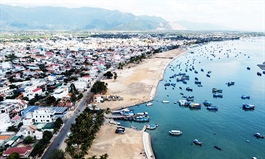Accelerating progress of good governance
Accelerating progress of good governance
The 2020 Provincial Governance and Public Administration Performance Index has seen some improvements and changes amid the ongoing pandemic. Dang Hoang Giang, deputy director of the Centre for Community Support and Development Studies – a collaborator in the research – discussed with VIR’s Bich Thuy the highlights and expectations in the upcoming index, driven by the new leadership.
In its 12-year history, the Provincial Governance and Public Administration Performance Index (PAPI) programme has witnessed plenty of evolution. What is the current status of the 2020 Index?

Dang Hoang Giang, deputy director of the Centre for Community Support and Development Studies – a collaborator in the research
|
In the past, cities and provinces in the south often led the PAPI index. However, the trend seemed to cease as the 2020 PAPI saw many those in northern and central regions named at the top of the list.
As seen in PAPI 2020, there are some sad changes. Hanoi is in the group of cities and provinces with low ranking despite strong effort from local authorities. Elsewhere, Danang dropped to the bottom-line group, even though it topped the list in the earlier years of the index.
One highlight is that some central provinces like Quang Ngai, Quang Binh, Quang Tri, and Nghe An are maintaining their high rankings over many years.
In PAPI 2020, Quang Ninh made impressive results in varied dimensions from the economy and public administration to vertical accountability towards citizens and others.
During 2020, COVID-19 caused serious impacts in all socioeconomic aspects. Did the pandemic affect the accuracy and assessment of the research?
Provincial governance and public administration was not affected by the pandemic as much as economic sectors were. PAPI focused on transparency and corruption, administrative procedures, and public services, which were not hit. Some dimensions like healthcare and education were little affected. Fortunately, COVID-19 has been controlled successfully here.
We interviewed 14,000-15,000 citizens nationwide, which experts say is a large enough figure to ensure the quality of the PAPI database. So for years, the quality and the results have remained stable.
The PAPI index has created great changes in the performance of state organs. How does the ranking of localities into groups rather than single ratings help in this regard?
We do not want to create an achievement run with this kind of ranking. With the division into groups, we want to prompt cities and provinces to race against themselves by looking thoroughly into dimensions to improve them year-by-year. Other contests may have specific rankings, but many of them focus on a narrow set of factors, while PAPI has over 120 indicators to take into account.
Vietnam’s new leadership has been inaugurated. What are your expectations for the upcoming PAPI index, and what are the grounds for this?
The government, led by the former prime minister, said that there has been a modest improvement of 1-2 per cent annually in the PAPI index. With the new leadership, we hope that the uptrend will continue and reach at least 3-4 per cent.
It is too early to say which provinces and cities will perform better in the upcoming PAPI index, but we do hope the growth momentum remains in the gun barrel.



























